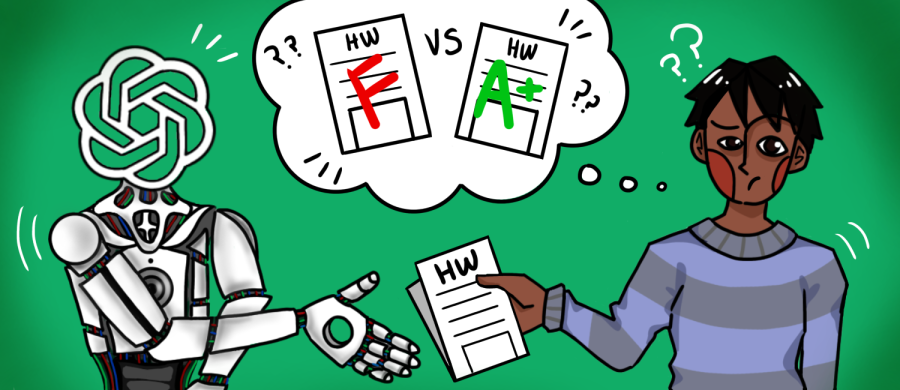YES: Apps like ChatGPT hinder student growth
Artificial intelligence [AI] programs have been aiding generations through educational applications such as Grammarly, Mathway, Symbolab, Google Translator and more, which provide means of instruction for those who utilize their features.
Specifically, an AI platform called ChatGPT has been gaining traction since its launch in November 2022.
As a chatbot capable of writing essays, drafting emails and answering questions for those who need extra assistance, this rising platform has opened the potential for students to use to complete their writing assignments for them, which can be interpreted by school officials as a form of plagiarism.
At Sunny Hills, English teachers who have addressed this concern with their classes should be applauded for doing so.
Schools should start taking more serious and specific measures to ban these programs in classrooms for any educational purposes. Though some educators have increasingly been combating the use of AI in classrooms, whether it be through in-class essays or signed contracts, more teachers in other academic subjects should consider the long-term risks of becoming dependent on technology.
Although this program allows for students to easily be stress-free about their academics, the more students rely on apps to do their homework, the less they will learn to be self-sufficient and confident in their academic abilities. Ultimately, students won’t be putting in any work at school.
Without being given the opportunity to learn, they mindlessly copy off of these apps that give answers for free.
Students will become used to talking to a chatbot instead of asking teachers for help. Eventually, not one school-learned skill will be able to be applied in the real world.
While it is believed that ChatGPT is a 24-hour service that will give accurate answers — in actuality, the robot will not always know the exact problem and how to solve it correctly, which may lead to an error on the students’ end.
At times, teachers may never know that their students are using a robot to write an essay for them. But if perpetrators do get caught, they face detrimental effects that may affect their capability to get into colleges.
Ultimately, students should show academic responsibility for their own work.

Outside of The Accolade, Martinez is in several clubs and is very present in her school life. She hopes to see more students on The Accolade website around campus reading articles and taking polls.
NO: If we can’t beat it, we need to embrace it
A world of artificial intelligence [AI] is not approaching. It’s already here.
Since its initial launch in November 2022, ChatGPT, a chatbot released by the technology research company OpenAI, has been a powerful tool in aiding people to perform human-like writing tasks with remarkable speed and skill.
From writing realistic work emails to debugging complex lines of computer code, ChatGPT is capable of it all.
Though the exponentially growing improvements of AI platforms are undeniably historic milestones, educators across the world express opposition to the spread of such technologies, executing harsh measures to prevent students from utilizing AI for school.
Banning AI technologies in a classroom environment is a reasonable response to the alarming potential and growing power of ChatGPT. This is just as competent in drafting literary analysis essays or solving mathematical proofs.
In a world where AI will only prosper further from now, attempting to restrict any sort of AI usage for educational purposes is a nearsighted response that fails to counter any real problem.
Instead of pushing futile bans to counter the unavoidable developments of AI, educators should consider embracing this new factor and implementing changes in classrooms to reflect the current technologically advanced society. In the long run, working to complement ChatGPT is far more pragmatic than trying to limit it.
“Designing authentic tasks that are highly personalized and contextualized, and perhaps involve multimedia elements, will mean that students can only use tools like ChatGPT as a starting point. Teachers may choose to use AI as a prompt for discussion and collective critique that students will then need to build upon,” wrote Matt Bower, interim dean and professor of the Macquarie University School of Education, in a recent Los Angeles Times editorial.
Using technology as calculators, spell-checkers and MLA format generators is typical in educational settings. And even if ChatGPT, admittedly, varies from websites like Grammarly or Easybib, the future holds no promises to how normalized AI technologies can become.
At the end of the day, AI is unstoppable. Though ChatGPT may be the knowers, students still remain the thinkers.

Outside of The Accolade, Lee is involved with several school clubs, such as UNICEF and Science Olympiad. In her free time, she enjoys playing the piano and spending time with her older sister, Vivian.

